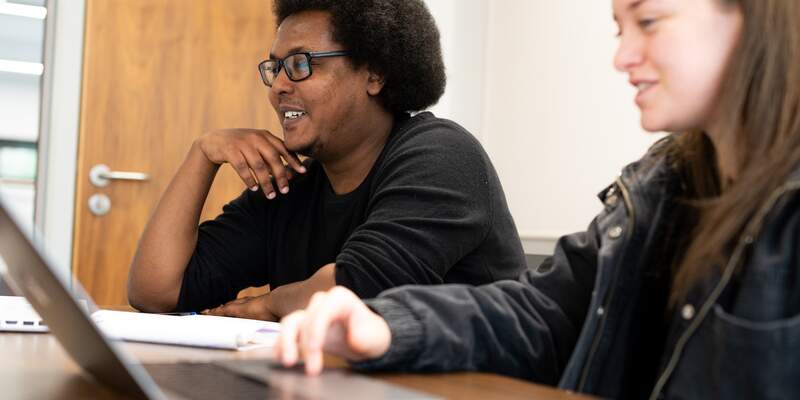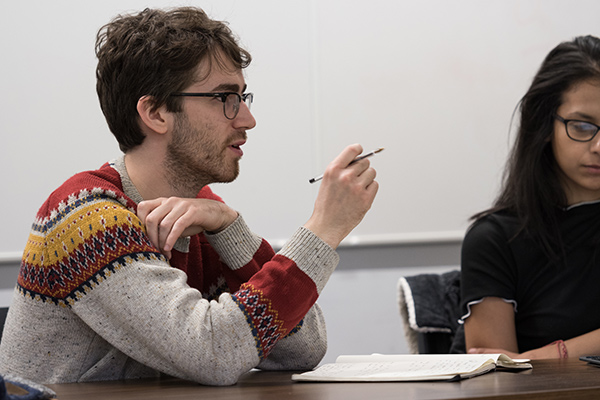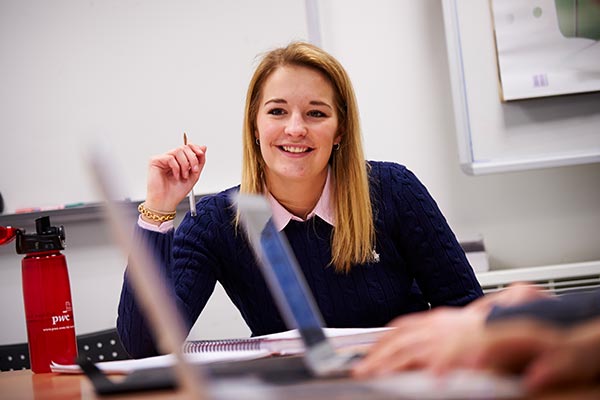
Consider self and society, cultivating valuable skills in critical thinking, reasoning and analysis
Year of entry: 2024/25
V5L3
Y50
3 years full-time (plus optional placement year)
AAB/A*BB/A*AC (full entry requirements)
September 2024 (semester dates)
Book your place for our Open Days on Saturday 22 and Sunday 23 June.
Book your placePhilosophy with Sociology complement each other, giving you a deeper understanding of human behaviour, social norms, morality, and the workings of the mind. You will study some of the greatest and most influential thinkers while exploring the relationship between self and society.
Taught by experts in their fields, this exciting and challenging degree will cultivate valuable skills in critical thinking, reasoning, analysis, creative problem-solving and communication, equipping you for a wide range of careers.

Our Arts and Humanities faculty is ranked 66th in the QS World University Rankings by Subject 2023.
and 14th in the UK for Sociology, according to the Complete University Guide, 2024
Studying philosophy is an engaging yet demanding activity that will challenge your thinking, giving you a greater understanding of your own nature and that of the world around you. In sociology you will build on this by exploring issues such as globalisation, inequalities and social change and how these relate to individual and social identities.
Benefiting from the expertise of two large and diverse departments you have a wide range of options to choose from. We offer modules in all the central areas of philosophy and sociology and you can tailor your degree to reflect your own areas of interest. The modules on offer may change from year to year
There are opportunities for you to spend time abroad during your course:
There are opportunities to spend time in industry as part of this course.
In your first year you'll gain a firm grounding in philosophy, learning how to study, think and write philosophically, and developing your skills in reasoning and argument. We'll introduce you to some of the central areas of philosophy and challenge you to form your own opinions about the bigger questions. You'll explore the nature of morality and ethical systems, and be introduced to the language of logic.
In sociology, you will explore key elements of sociological theory and methodology. We'll ask you to think about a range of issues such as social class, race and ethnicity and popular culture.
You will also study one Philosophy option module:
In addition to the above you will also need to complete our online Academic Integrity module.
This module covers some of the essential skills and knowledge which will help you to study independently and produce work of a high academic standard which is vital for success at York.
This module will:
In the second year, you'll choose from modules which look in more depth at topics in theoretical and practical philosophy (including mind, language, logic, metaphysics), value (including ethics, philosophy of art) and key figures and movements in the history of philosophy. You will also take sociology modules that will challenge you to think critically about issues in contemporary society.
You will also study three option modules, two from Philosophy and one from Sociology:
You may be able to replace one option module with an elective module, studying a complementary subject, a language or an interdisciplinary topic.
In the third year you can specialise further, choosing from a wide range of modules based in our latest research, and supported by subject experts enabling you to tailor your degree to your particular interests. You'll also complete a dissertation or take additional option modules.
You will also study five option modules (including two Sociology options). Examples may include:
You may be able to replace one option module with an elective module, studying a complementary subject, a language or an interdisciplinary topic.
Our modules may change to reflect the latest academic thinking and expertise of our staff.
Every course at York has been designed to provide clear and ambitious learning outcomes. These learning outcomes give you an understanding of what you will be able to do at the end of the course. We develop each course by designing modules that grow your abilities towards the learning outcomes and help you to explain what you can offer to employers. Find out more about our approach to teaching and learning.
| UK (home) | International and EU |
|---|---|
| £9,250 | £23,700 |
The level of fee that you will be asked to pay depends on whether you're classed as a UK (home) or international student. Check your fee status.
For more information about tuition fees, any reduced fees for study abroad and work placement years, scholarships, tuition fee loans, maintenance loans and living costs see undergraduate fees and funding.
This course gives a great deal of flexibility in terms of the modules you may choose to study. You may choose to buy your own copies of texts, although course books will be available from the library, and online reading packs are available for most modules.
We'll confirm more funding opportunities for students joining us in 2024/25 throughout the year.
You can use our living costs guide to help plan your budget. It covers additional costs that are not included in your tuition fee such as expenses for accommodation and study materials.

Our teaching, learning and student experience is outstanding, recognised by a Gold rating from the Office for Students in the 2023 national assessment (Teaching Excellence Framework).
You’ll study and learn with academics who are active researchers, experts in their field and have a passion for their subjects. Our approach to teaching will provide you with the knowledge, opportunities, and support you need to grow and succeed in a global workplace. Find out more about our approach to teaching and learning.
As a student of Philosophy with Sociology, you need to be an active participant in your own learning, asking questions and evaluating your own thoughts, beliefs and responses. You will take part in discussions with your peers and academic staff and develop your knowledge and skills through:
Every member of staff has weekly feedback and advice time, and students are actively encouraged to use this opportunity for one-to-one contact and informal discussion.
In your first year, you can expect:
| Lectures | 7-8 hours per week |
|---|---|
| Seminars | 4-5 hours per week |
These figures are representative of a typical week. Your contact hours will vary throughout the year due to your module choices, non-compulsory classes, exam periods and changes to scheduled activities.
Outside your timetabled hours, you'll study independently. This may include preparation for classes, follow-up work, wider reading, practice completion of assessment tasks, or revision.
In the UK, full-time students are expected to spend 1,200 hours a year learning. That's about 40 hours of classes and independent study each week during semesters. Everyone learns at a different rate, so the number of hours you spend on independent study will be different to other students on your course.
You will be based in the departments of Philosophy and Sociology. You will be taught at a variety of locations across Campus West and Campus East.
Our beautiful green campus offers a student-friendly setting in which to live and study, within easy reach of the action in the city centre. It's easy to get around - everything is within walking or pedalling distance, or you can use the fast and frequent bus service. Take a campus tour.
You will be assessed by a combination of essays and examinations, critical literature reviews, exercises that test analytical skills, research methods exercises, a podcast, and the Philosophy dissertation/project. We give feedback on your ideas in class, and provide written feedback on all your submitted work.


Both departments feature research-led teaching, ensuring you're taught by specialists in their research area.
There are chances to study abroad, from a year exchange to summer schools overseas.
When you study BA Philosophy with Sociology, you'll develop a deep understanding of the world around you. Gain valuable skills in analysis, creative problem-solving and clear communication. Through individual and team work, you'll be ready to consider contrasting perspectives and put ethical practice at the heart of your career.
 Through reflection and study of decisions, and the application of philosophical tools, we can improve the quality of decisions that institutions takeHarry Evans, Philosophy Alumni
Through reflection and study of decisions, and the application of philosophical tools, we can improve the quality of decisions that institutions takeHarry Evans, Philosophy Alumni
Senior Strategy Advisor, NHS
| Typical offer | |
|---|---|
| A levels | AAB/A*BB/A*AC |
| Access to Higher Education Diploma | 36 credits at Distinction and 9 credits at Merit or higher |
| BTEC National Extended Diploma | DDD |
| Cambridge Pre-U | D3, D3, M2 |
| European Baccalaureate | 80% overall |
| International Baccalaureate | 35 points |
| T levels | We will consider a range of T Level qualifications for entry. Please visit our dedicated T Levels page for a full list of accepted T Levels. |
| Scottish Highers / Advanced Highers | Scottish Highers - AABBB Advanced Highers - not required for entry We may also be able to consider three Advanced Highers or a combination of Highers and Advanced Highers, where an applicant does not meet the grade requirement through Highers alone. Please contact us to discuss your qualifications. |
| Other international qualifications | Equivalent qualifications from your country |
Meeting the following additional criteria may qualify you for an alternative offer.
| Criteria | Adjustment |
|---|---|
| Widening participation | If you successfully complete one of the following programmes, you may be eligible for an alternative offer up to three A level grades (or equivalent) below our typical offer: Black Access Programme, Next Step York, Realising Opportunities, YESS, YorWay to York. More about widening participation. |
| Contextual offers | If you have experience of local authority care or live in an area with low progression to university, you may be eligible for an alternative offer up to two A level grades (or equivalent) below our typical offer. More about contextual offers. |
| EPQ | If you achieve C or higher at EPQ, you may be eligible for an alternative offer up to one A level grade (or equivalent) below our typical offer. |
| Core Maths | If you achieve B or higher in Core Maths, you may be eligible for an alternative offer up to one A level grade (or equivalent) below our typical offer. |
| MOOCs | If you successfully complete our online course Logic: the language of truth do let us know, as you may be eligible for an alternative offer up to one A level grade (or equivalent) below our typical offer. More about MOOCs. |
If English isn't your first language you may need to provide evidence of your English language ability. We accept the following qualifications:
| Minimum requirement | |
|---|---|
| IELTS (Academic) | 6.5, with a minimum of 6.0 in each component |
| Cambridge CEFR | 176, with a minimum of 169 in each component |
| Oxford ELLT | 7, with a minimum of 6 in each component |
| Duolingo | 120, minimum 105 in each component |
| GCSE/IGCSE/O level English Language (as a first or second language) | Grade C / Grade 4 |
| LanguageCert SELT | B2 with a minimum score of 33/50 in each component |
| LanguageCert Academic | B2 Communicator with a minimum score of 33/50 in each component |
| KITE | 459 Main Flight score with 426 in each component |
| Skills for English | B2: Merit overall, with Pass with Merit in each component |
| PTE Academic | 61, with a minimum of 55 in each component |
| TOEFL | 87 overall, with a minimum of 21 in each component |
| Trinity ISE III | Merit in all components |
For more information see our undergraduate English language requirements.
You may be eligible for one of our pre-sessional English language courses. These courses will provide you with the level of English needed to meet the conditions of your offer.
The length of course you need to take depends on your current English language test scores and how much you need to improve to reach our English language requirements.
After you've accepted your offer to study at York, we'll confirm which pre-sessional course you should apply to via You@York.
Get in touch if you have any questions



We offer a range of campus accommodation to suit you and your budget, from economy to premium.

Explore campus and city life and hear what our current students have to say about living here.

Lively, full of culture and beautiful, York is regularly voted one of the best places to live and visit in the UK.

Find out more about York. Chat to staff and students and take the tour, on campus or online.